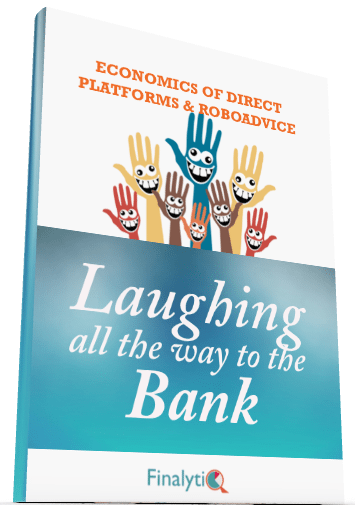We are beyond chuffed to introduce the maiden edition of our Economics of Direct Platforms & Robo-Advice Report.
The UK direct platform market has come a long way and now caters for well over £150 billion of investors assets at the end of 2015. However the growth in the sector hasn’t been without some casualties, as evidenced by the consolidation and withdrawals from the marketplace, but who are the winners and losers going forward? How do direct platforms stack up in terms of financial performance and specifically, profitability? How has the unprecedented growth in AUA been reflected in the bottom-line of platforms?
This report looks at trends in the financial performance and profitability of direct-to-consumer platforms over the last four years. We examine the following key metrics to give a clearer picture of the financial health of direct platforms:
- AUA;
- revenue
- pre-tax profits/losses
- yield on assets and
- P&L account reserve
- debt-to-capital ratio
According to filed reports, direct platforms reported a total pre-tax profit of £235 million on a revenue of £931 million at the end of 2014, a healthy profit margin of just over 25%! Over the period between 2011 – 2014, pre-tax profit margins have hovered at around the 25% mark!
Obviously, within the cohort there are losers and winners, as not every provider is profitable. And we explore the individual performance of direct platforms in the report but overall as a sector, suffice to say, direct platforms are laughing all the way to the bank!
[bctt tweet=”UK direct platforms reported a total pre-tax profit of £235m on a revenue of £931m in 2014, a healthy profit margin of just over 25%!”]
Despite the healthy financial performance highlighted in this report, the UK direct platform market has been littered with some serious causalities over the last few years including online broker E*Trade which exited the market in 2012 after a cumulative loss of £65million; Seltrade exited in 2014 with parent company writing down around £61.1 million in losses and even giant RBS pulled the plug on its NatWest stockbrokers business and sold its stake to joint-venture partner TD Direct.
Rated
To give investors an indication of long term viability of platform providers, we benchmarked and rated 16 direct platforms based on their financial platformance, with the likes Hargreaves Lansdown and Bestinvest bagging the ‘excellent’ rating, while TD Direct and Interactive Investor were ranked as ‘poor’.

The objective of the rating is very simple; to provide a simple metric for investors to gauge the long-term viability of their platform providers. As we’ve been saying, the direct platform industry is going through major systemic change. There’ll be winners and losers. Our view is that providers who are profitable and scalable are far better able to weather the storm.
[bctt tweet=”FinalytiQ rates direct platforms to provide a metric for investors to gauge long-term viability of their platform.”]
Robo Rage!
With a changing retail distribution landscape, robo-advice is all the rage right now. We know that discussions are going on in boardrooms; banks, providers and asset managers are wondering if robo-advice is the next big thing.
So we thought we’d do a little bit of poking around into the economics of roboadvice. But, as the robo-advice market is still nascent in the UK, we have looked at the developments across the pond. In the report, we examine the capital raised by startup robo-advisers, their fee model, assets under management (AUM) and their estimated revenue.
Our data for robo advice platforms in the US is sourced from Form ADV. This is the uniform form used by investment advisers registered with both the Securities and Exchange Commission (SEC) and state securities authorities.
Our conclusion is that the vast majority of these robo-advice startups will fall by the way side or end up being acquired by the incumbents. We expect 3 to 5 winners to emerge and passive funds providers such as Vanguard, Fidelity, Blackrock and Aberdeen (through its ownership of Parmenion and SWIP) are better positioned than tech startups to win the robo-advice race!
[purchase_link id=”4271″ text=”Add to Cart” style=”button” color=”blue”]
If you prefer us to invoice you directly, please emai: abraham@finalytiq.co.uk



